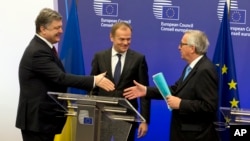Ukraine's president tried to reassure the European Union on Thursday that his country would soon overcome a political crisis that has rattled Western lenders and he won support for Kyiv's cherished goal of visa-free travel in Europe for its citizens.
Ukraine's unpopular prime minister, Arseniy Yatsenyuk, survived a parliamentary vote of no-confidence last month but three parties have quit his coalition and Western creditors who are keeping Ukraine's economy afloat are frustrated with the slow pace of reforms.
"We have a political crisis in Ukraine and I hope that by the end of the month we will find a solution," President Petro Poroshenko told reporters, alongside European Council President Donald Tusk and European Commission President Jean-Claude Juncker.
"There will be no early parliamentary elections and the political coalition will remain, will be responsible, orientated on reforms," Poroshenko said after his talks with the two top EU officials, adding an EU-Ukraine summit would be held on May 19.
Western donors, who include the European Union and the United States, are urging Kiev's leaders to remain unified to pass the reforms needed to secure a further $1.7 billion in aid from the International Monetary Fund and to do much more to tackle rampant corruption.
Diplomats said Tusk and Juncker had repeated this message to Poroshenko on Thursday and had also argued against new elections which would only further delay reforms.
But in happier news for Kyiv, Juncker said the European Commission, the EU's executive, would formally propose next month ending the requirement for Ukrainians to get visas to visit EU member states. The proposal would have to be approved by the EU's 28 national governments and the European Parliament.
While lifting the EU visa requirement will be sensitive, especially in Germany, as Europe struggles with its migration crisis, the step would be the most tangible sign for Ukrainians that their 2014 Western-backed uprising against a pro-Russian president, Viktor Yanukovych, was finally paying dividends.
After Yanukovych fled to Russia, Moscow annexed Ukraine's Crimea region and gave support to armed separatists in mainly Russian-speaking eastern Ukraine in a conflict in which more than 9,000 people have been killed and is still simmering.
Moscow denies sending arms or troops into Ukraine but has demanded greater autonomy for the country's heavily industrialized eastern region.





